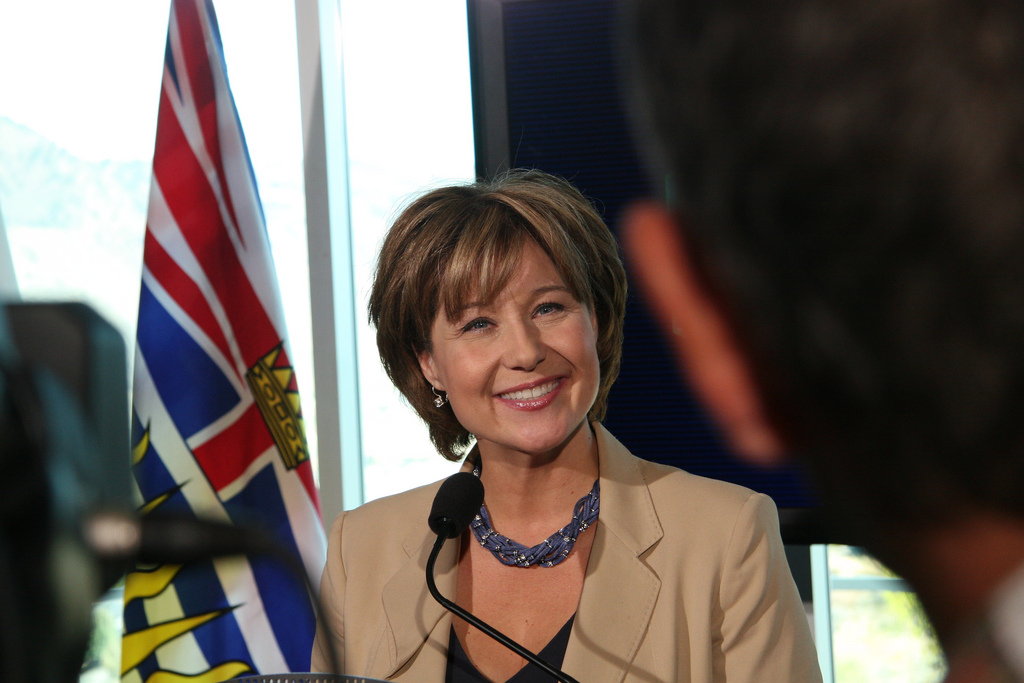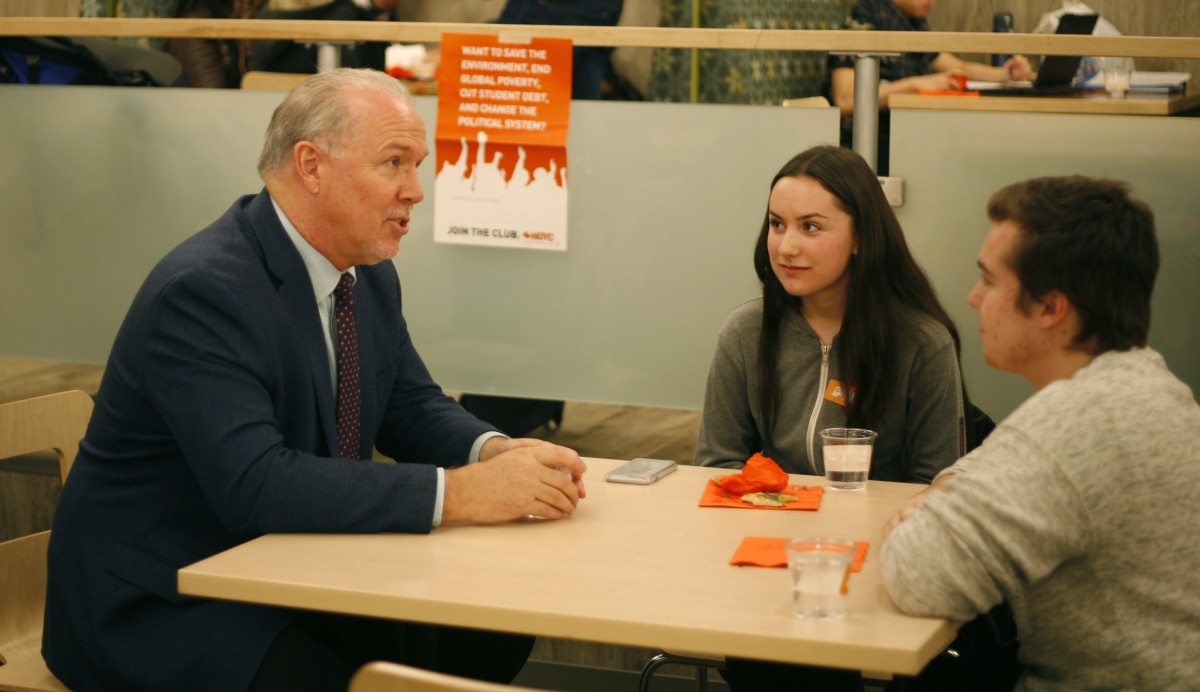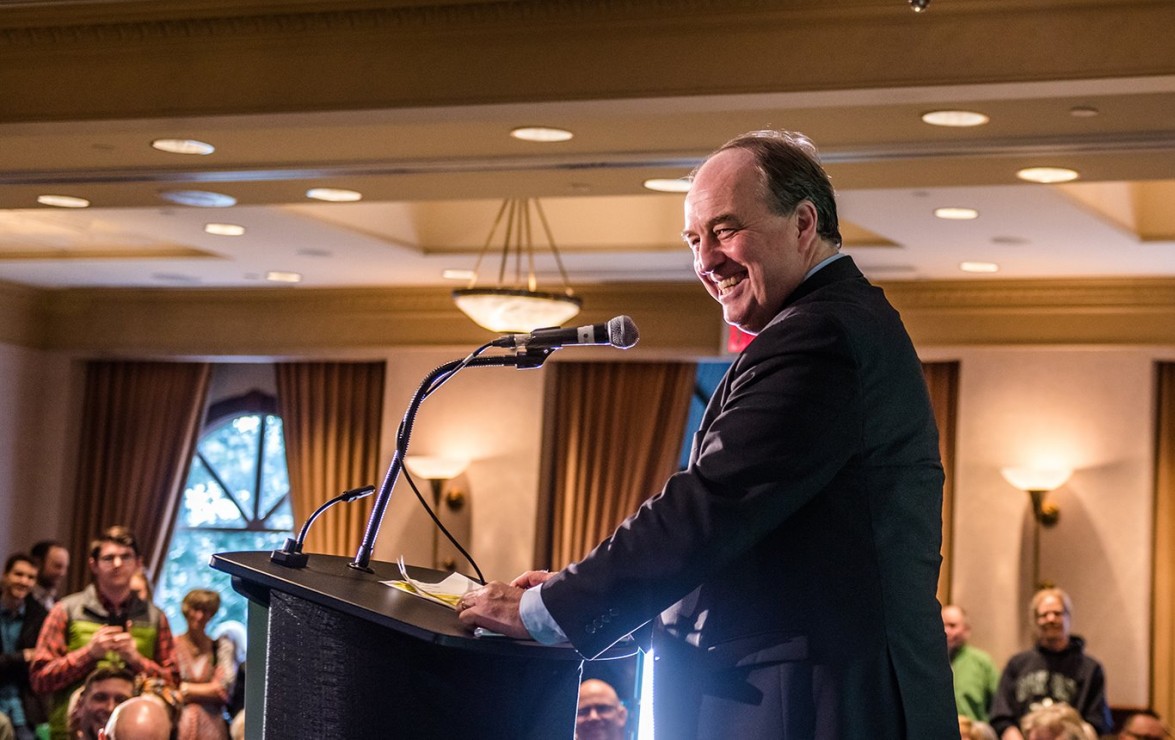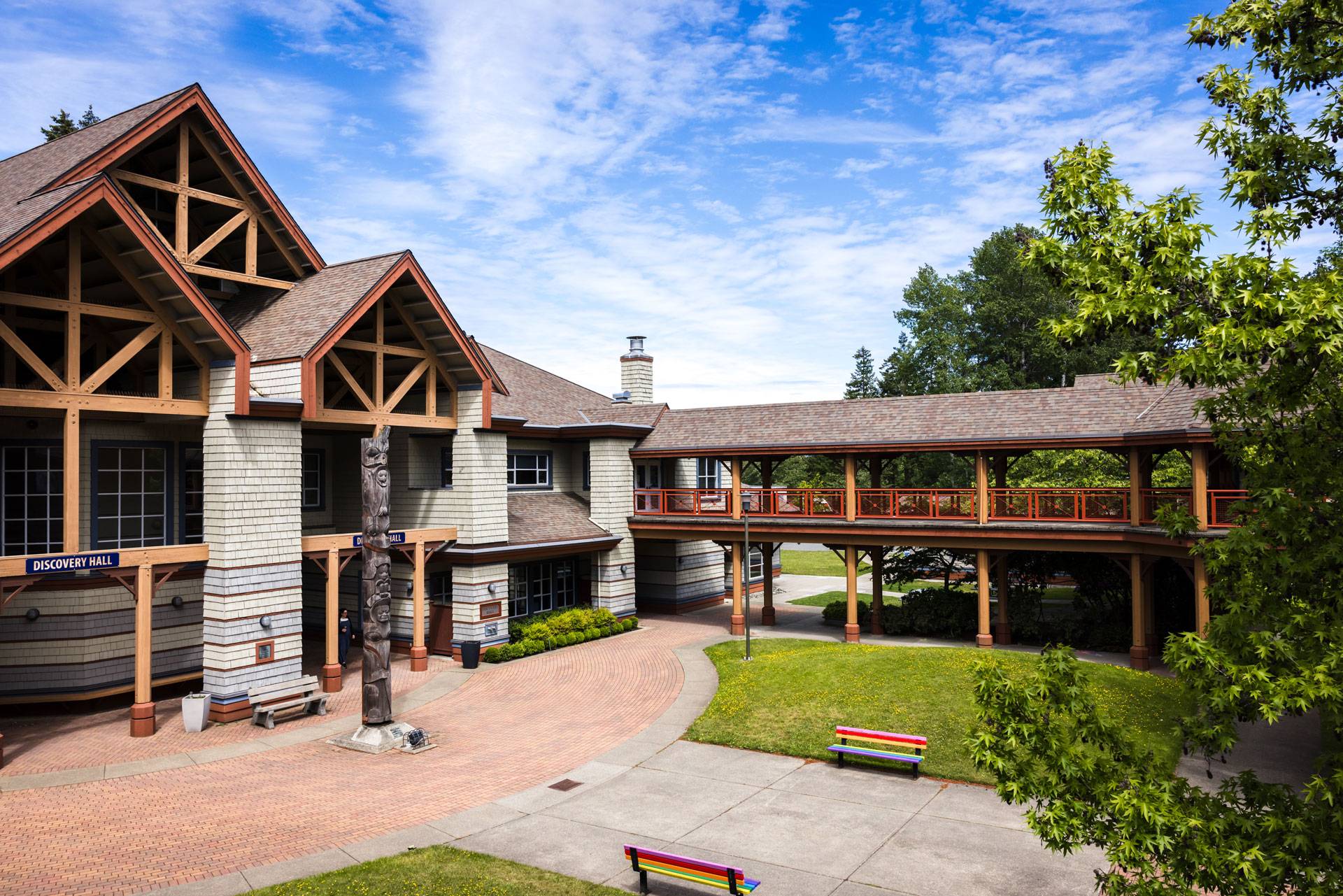
Premier Christy Clark, seen here at Thompson Rivers University on Sept. 21, 2011, is running for re-election with the B.C. Liberals on May 9. Photo by TRU via Flickr/Creative Commons
On Tuesday, May 9, the B.C. Green, NDP, and Liberal parties will vie for the votes of British Columbians in the province’s 41st election. Each party’s platform is lengthy and encompasses many areas of interest, and while advanced voting has been ongoing for a short while already, we know some readers may still be undecided in how they cast their vote.
To help you along, below is a brief summary of each platform relating to three important issues, with a specific focus on their relevance to students: post-secondary education, housing, and the environment. All bullet points are pulled directly from each party’s respective platform and do not reflect the Martlet’s endorsement of any particular party or policy.
This breakdown is not meant to be exhaustive, and we encourage readers to consult other news sources in making their decision.
Post-secondary education
Near and dear to the hearts of students (obviously), post-secondary education is always a determining factor of the youth vote. Here’s what each party is promising university and college students around the province.
Green Party:
- Implement needs-based grants for post-secondary students,
- Offer tax forgiveness of up to $2 000 a year for up to five years to assist qualifying graduates to repay outstanding debt incurred for tuition fees,
- Set up a task force on post-secondary education funding with a mandate to identify ways to make post-secondary education more relevant, accessible, and affordable. The task force will present its report by July 2018,
- Invest $65 million over four years to support co-op and work experience programs for high school and undergraduate students, and
- Allocate up to $10 million per year for in-service skills training for workers in small and medium-sized enterprises (SMEs); and, retraining for those displaced by automation or changing markets.
NDP:
- Provide a $1 000 completion grant for graduates of college, university and skilled trades programs to help pay down debt when they finish their programs,
- Eliminate fees for Adult Basic Education and ESL and keep a cap on tuition fees at colleges and universities,
- Make all current and future B.C. student loans interest free,
- Change regulations to allow colleges and universities to build affordable on and near-campus rental housing, and ensure student renters receive the renter’s rebate of $400 per year, and
- Invest $50 million over two years to create a new graduate scholarship program.
Liberal Party:
- Create an additional 1 000 new grads in tech supporting science, technology, engineering, and math disciplines in universities and college across the province by 2022,
- Lower the interest rate on student loans to prime — saving people around $45 million over the next three years,
- Continue to expand the open textbook program by committing an additional $10 million over the term,
- Invest nearly $6 billion in education and training in 2017, and
- Maintain the two per cent cap on tuition and fee increases at provincial universities, colleges and technical institutes.

B.C. NDP leader John Horgan speaks with students at an NDP open house hosted in Vertigo on Jan. 29. Photo by Belle White, Photo Editor
Housing
Earlier this year, we spoke about housing issues facing students on our podcast (Vol. 2, Episode 7), such as low vacancy rates in Vancouver and the Greater Victoria Area — 0.5 per cent as of November in the case of the latter. The current average rent in Vancouver is among the highest in the country, putting the squeeze on everyone from students to young professionals. As the election looms, voters may be influenced by what the parties are promising.
Green Party:
- Invest up to $750 million per year to support the construction of approximately 4 000 new units of affordable housing per year,
- Work with federal and local governments to make land available for the construction of affordable housing,
- Protect existing social housing and reduce operating costs by investing $100 million per year in retrofits and renovations of older units,
- Partner with First Nations, non-profit developers, cooperatives, and the private sector to support the planning and construction of low income rental units, and
- Enhance the provisions of the Residential Tenancy Act to control rent increases, and to protect tenants from tenure termination that will result in the loss of affordable accommodation.
NDP:
- Build 114 000 affordable rental, non profit, co-op and owner-purchase housing units through partnerships over ten years. These homes will be a mix of housing for students, singles, seniors, and families and will range from supported social housing to quality, market rental housing.
- Get new student housing built by removing unnecessary rules that prevent universities and colleges from building affordable student housing.
- More from The Martlet on the issue of residence housing here.
- Provide a refundable renter’s rebate of $400 dollars per rental household in B.C. each year, and
- Close the B.C. Liberals’ “fixed term lease” loophole and ensure controls on rent increases are enforced.
Liberal Party:
- Increase housing supply by working with municipalities to speed up permitting and open new opportunities for housing,
- Raise the threshold of the First Time Home Buyers’ Program exemption to $500 000, saving first-time home buyers up to $8 000,
- Invest $700 million in the BC HOME Partnership program to provide mortgage down payment assistance loans to an estimated 42 000 first-time home buyers over the next three years,
- Continue support for RAP and SAFER to assist over 33 000 low-income families and senior households with their rent each year, and
- Working with post-secondary institutions, develop new student housing financing rules that allow student housing to be built without impacting the provincial debt load or credit rating.

B.C. Green Party leader Andrew Weaver is running for re-election in the Oak Bay-Gordon Head electoral district. Photo via B.C. Green Party/Facebook
The environment and climate change
This may very well be one of the most polarizing topics of this election. Debates surrounding climate change initiatives, Site C, and Kinder Morgan have been raging for months, and party leaders stand divided.
Green Party:
- Provide $31 million to fund climate adaptation initiatives, and work with other levels of government to develop a coordinated approach to disaster risk reduction related to a changing climate,
- Amend the Greenhouse Gas Reduction Targets Act to reflect an interim target of 40 per cent reduction below 2007 levels by 2030,
- Progressively increase the carbon tax by $10 per year for four years beginning January 2018,
- Invest $29 million over four years to enhance the scientific understanding of the effects of climate change in B.C., and, to support forest carbon management initiatives as part of the greenhouse gas emissions reduction strategy,
- Develop a new 10-year transportation plan focused on affordable, clean transportation for British Columbians, and
- Support local governments’ greenhouse gas emission reduction initiatives by investing $80 million over four years in green transportation infrastructure, climate adaptation measures, and building efficiency initiatives.
NDP:
- Create a new climate action rebate cheque for low and middle-income families. This cheque will go to 80 per cent of B.C. households, with a majority receiving more back from this rebate than they pay in new carbon taxes.
- Renew the Climate Leadership panel within our first 100 days, and work towards implementing their full suite of recommendations under our core principles for climate action,
- Put B.C. on a path to meeting B.C.’s legislated 2050 greenhouse gas emission reduction target of 80 per cent below 2007 levels and will set a new legislated 2030 reduction target of 40 per cent below 2007 levels,
- Ban the grizzly bear trophy hunt, and make permits for other kinds of hunting more fair for B.C. residents,
- Bring in an endangered species law and harmonize other laws to ensure they are all working towards the goal of protecting our beautiful province, and
- Stop the Kinder Morgan pipeline project from going ahead.
Liberal Party:
- Complete the Site C dam, creating clean, green energy for the next 100 years,
- Hit our climate change target of reducing 2007 greenhouse gas emissions by 80 percent by 2050,
- Invest $149 million for parks and environmental protection, including $36 million for the B.C. Parks Future Strategy,
- Finalize the Kinder Morgan agreement worth up to $1 billion in the B.C. Clean Communities Program — meaning between $25 million and $50 million annually for 20 years, and
- Maintain the carbon tax freeze until 2021, while other Canadian provinces catch up to B.C.’s $30/tonne carbon tax.
If you want to read more about some of the relevant issues and provincial candidates, check out our previous news coverage:
- May 3: “MLA candidates contest and concur”
- April 19: “What to look out for in the B.C. provincial election”
- April 5: “South Island MLA candidates go face-to-face with students”
- March 29: “Oak Bay-Gordon Head MLA candidates face off as election looms”
- Jan. 26: “B.C. NDP tackles big money at UVic open house”
- Oct. 20, 2016: “Housing solutions brainstormed at NDP town hall”
And our opinions commentary:
- April 20: “A concerned citizen for fair elections in B.C.”
- March 9: “B.C. budget raises hopes when we should be raising questions”
- March 2: “Liberal hack-usations backfire, political diversions continue”
Voting takes place on May 9 from 8 a.m. to 8 p.m. For more information on where you can vote, and what you need to do so, visit elections.bc.ca.
With files from Alistair Ogden






